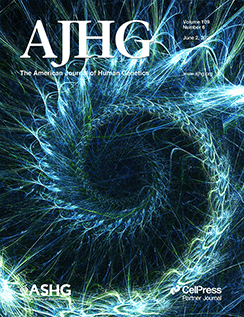双等位基因ugt1变异导致先天性糖基化障碍。
IF 8.1
1区 生物学
Q1 GENETICS & HEREDITY
引用次数: 0
摘要
先天性糖基化障碍(CDGs)是由糖蛋白和糖脂聚糖组装和重塑缺陷引起的一组异质性代谢疾病,这是一个具有广泛生物学作用的基本分子过程。在此,我们描述了来自10个不同种族背景的不相关家庭的15个个体的双等位基因ugt1变异,作为不同严重程度的独特CDG的原因。ugt1 - cdg的主要临床特征包括发育迟缓、智力残疾、癫痫发作、特征性面部特征和大多数小头畸形(可获得测量的9/11受影响个体)。受影响更严重的个体表现为先天性心脏畸形,包括脊柱侧凸在内的可变骨骼异常,以及肝脏和肾脏受累,包括模仿常染色体隐性多囊肾病的多囊肾。临床研究确定了基因型-表型相关性,显示双等位基因UGGT1功能丧失变异与疾病严重程度增加相关,包括婴儿期死亡。UGGT1编码udp -葡萄糖:糖蛋白葡萄糖基转移酶1,这是维持n链糖基化质量控制的关键酶。分子研究表明,致病的UGGT1变异体会损害UGGT1糖基化和催化活性,破坏mRNA剪接,或抑制内质网(ER)保留。总的来说,我们的数据提供了ugt1 - cdg的全面遗传、临床和分子特征,拓宽了n链糖基化疾病的范围。本文章由计算机程序翻译,如有差异,请以英文原文为准。
Bi-allelic UGGT1 variants cause a congenital disorder of glycosylation.
Congenital disorders of glycosylation (CDGs) comprise a large heterogeneous group of metabolic conditions caused by defects in glycoprotein and glycolipid glycan assembly and remodeling, a fundamental molecular process with wide-ranging biological roles. Herein, we describe bi-allelic UGGT1 variants in fifteen individuals from ten unrelated families of various ethnic backgrounds as a cause of a distinctive CDG of variable severity. The cardinal clinical features of UGGT1-CDG involve developmental delay, intellectual disability, seizures, characteristic facial features, and microcephaly in the majority (9/11 affected individuals for whom measurements were available). The more severely affected individuals display congenital heart malformations, variable skeletal abnormalities including scoliosis, and hepatic and renal involvement, including polycystic kidneys mimicking autosomal recessive polycystic kidney disease. Clinical studies defined genotype-phenotype correlations, showing bi-allelic UGGT1 loss-of-function variants associated with increased disease severity, including death in infancy. UGGT1 encodes UDP-glucose:glycoprotein glucosyltransferase 1, an enzyme critical for maintaining quality control of N-linked glycosylation. Molecular studies showed that pathogenic UGGT1 variants impair UGGT1 glucosylation and catalytic activity, disrupt mRNA splicing, or inhibit endoplasmic reticulum (ER) retention. Collectively, our data provide a comprehensive genetic, clinical, and molecular characterization of UGGT1-CDG, broadening the spectrum of N-linked glycosylation disorders.
求助全文
通过发布文献求助,成功后即可免费获取论文全文。
去求助
来源期刊
CiteScore
14.70
自引率
4.10%
发文量
185
审稿时长
1 months
期刊介绍:
The American Journal of Human Genetics (AJHG) is a monthly journal published by Cell Press, chosen by The American Society of Human Genetics (ASHG) as its premier publication starting from January 2008. AJHG represents Cell Press's first society-owned journal, and both ASHG and Cell Press anticipate significant synergies between AJHG content and that of other Cell Press titles.

 求助内容:
求助内容: 应助结果提醒方式:
应助结果提醒方式:


